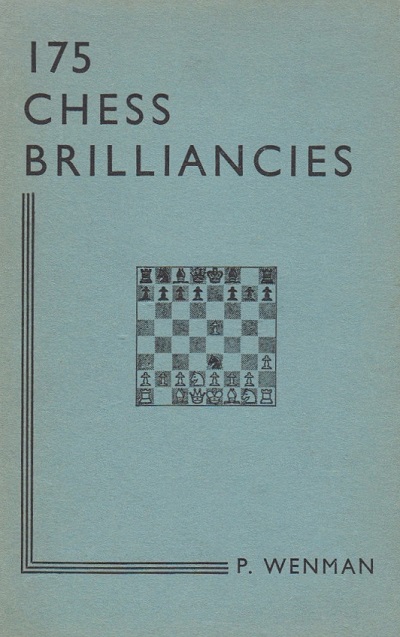
Edward Winter

Page 351 of Kings, Commoners and Knaves quoted two passages regarding the alleged Gibaud v Lazard brevity:
‘When in England recently, M. Znosko-Borovsky ... showed us the score of the following curious little game played in Paris last year: 1 d4 d5 2 Nf3 Bg4 3 Ne5 Nf6 4 Nxg4 Nxg4 5 Nd2 e5 6 h3 Ne3 7 White resigns.’
Source: page 221 of the June 1921 BCM.
‘Monsieur Gibaud asks us to correct a mistake made by the author of Curious Chess Facts [Irving Chernev] and quoted by us last month. He never lost any tournament game in four moves. Searching his memory he recalls a “skittles” he once played against Lazard, a game of the most light-hearted variety, in which, his attention momentarily distracted by the arrival of his friend Muffang, he played a move which allowed a combination of this genre – but certainly not four moves after the commencement of the game. Rumour, he said, must have woven strange tales about this game, coupling it perhaps with the theoretical illustration Znosko-Borovsky gives on page 24 of his Comment on devient brillant joueur d’échecs (Paris, 1935).’
Source: page 420 of CHESS, 14 July 1937.
We commented that the shortest version (1 d4 Nf6 2 Nd2 e5 3 dxe5 Ng4 4 h3 Ne3 5 White resigns) regularly appears in books and that in his introduction to Chess Tactics (Ramsbury, 1984) Paul Littlewood even called it ‘the shortest match game known in chess literature – Gibaud-Lazard, Paris, 1927’. Richter’s Kombinationen (various editions) dated it 1935.
Now, Dominique Thimognier (Fondettes, France) forwards a cutting from page 12 of the Feuille d’Avis de Lausanne, 24 June 1933 (chess column by André Chéron):
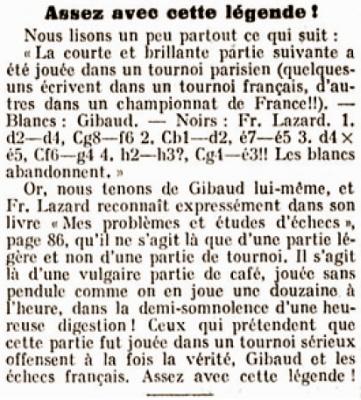
(7904)
Chernev’s Curious Chess Facts was published in 1937. At the outset of a column of the same name, he gave the following on page 4 of the February 1933 Chess Review:

Below is the news item quoted in C.N. 7904 from page 221 of the June 1921 BCM:

The text appeared in the ‘Colonial and Foreign News’ section, of which the Editor was apparently P.W. Sergeant (see page 396 of the October 1922 BCM).
Our earlier item included a Chéron cutting which referred to page 86 of Lazard’s book Mes problèmes et études d’échecs (Paris, 1929). That page is shown below, courtesy of Alain Biénabe (Bordeaux, France):
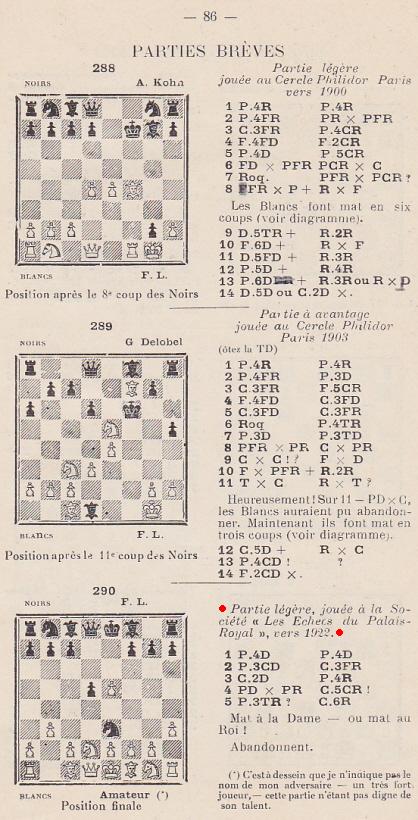
(7927)
From page 2 of Traps on the Chessboard by E.A. Znosko-Borovsky (London, 1938):
‘Another fine example of this murderous check by the queen at KR5 is supplied by a game won by F. Lazard in Paris in 1922 (Queen’s Pawn Game): 1 P-Q4 P-Q4 2 Kt-Q2 Kt-KB3 3 P-QKt3 P-K4 4 PxP Kt-Kt5 5 P-KR3?? Kt-K6 and White resigns. His queen is lost for, if 6 PxKt, then 6...Q-R5ch and mate next move.’
When the game was published on page 20 of volume two of Lehrbuch der Schachtaktik by Alexander Koblenz (East Berlin, 1972) the opening was identified as the Budapest Gambit, and White was named as ‘Gibaut’.
Page xxiv of The Blue Book of Charts to Winning Chess by Arthur M. Stevens (South Brunswick and New York, 1969) took a discredited game and added more fiction. Other imprecision includes the misspelling of Monsieur six times:
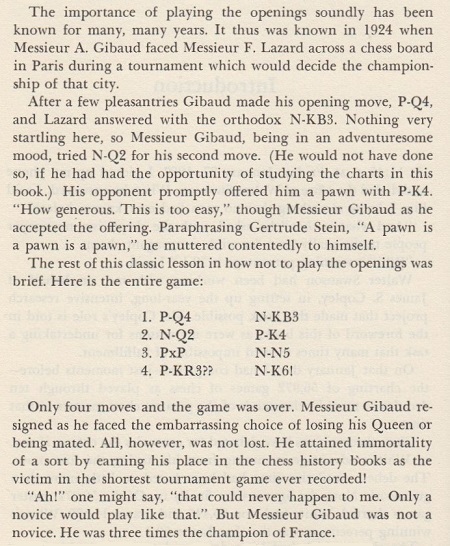
(9537)
Avital Pilpel (New York, NY, USA) draws our attention to the following passage from pages 10-11 of Cannibals in the Cafeteria by Stephen Pile (New York, 1988):
‘Gibaud has been overthrown. Ever since 1924 this French chess master has been revered for achieving defeat in only four moves. A Monsieur Labard [sic] played the walk-on part in this great scene.
But in the 1959 US Open Championship somebody called Masefield was a useful foil, moving around the white pieces in a match that enabled the immortal Trinka to be checkmated in three moves: 1 P-K4 P-KKt4; 2 Kt-QB3 P-KB4; 3 Q-R5 mate.’
We have yet to find particulars of the other game in a contemporary source, but ‘Masefield v Trinka, Omaha, 1959’ is often referred to in modern sources. Even so, the homepage of a certain Pakistani chess site has the following item under the inapt heading ‘Chess Facts’:
‘You might not going to believe it but this game is happened to be a shortest game in Chess history. The match was played between first British GM title Comins Mansfield (for Chess composition) and Trinks in the 1961 U.S.A. Open Chess Championship.
1 e4 f5 2 Nc3 g5 3 Qh5++.’
If a ‘sic’ were to be inserted after each instance of inaccuracy or illiteracy in the above quotation there would, by our count, be eight of them.
(3295)
In C.N. 3295 we mentioned having found no particulars about the alleged 1959 game in any contemporary source, and that remains the case today. As regards the players’ names, however, it may be noted that different versions appeared on page 30 of Das Spiel der Könige by Alfred Diel (Bamberg, 1983):
‘Die kürzeste Turnierpartie wurde 1959 bei der Offenen Meisterschaft von Omaha (USA) gespielt. Dabei wurde Trinks von Mayfield nach 1 e4 g5 2 Sc3 f5 mit 3 Dh5 mattgesetzt.’
(4493)
See too the entry ‘Shortest games’ in the Factfinder.
We should like to know when Amédée Gibaud died. It is a point on which the reference books are silent.
Gibaud won the French championship several times. Page 338 of the November 1946 issue of Le monde des échecs (which gave his forename as Aimé) stated that he had retired from the French postal service and was living in Nice.
(3077)
The above was written in 2003, since when many further details have been found. See, in particular, the Héritage des échecs français website.
C.N. 7156 gave this photograph of Gibaud (right) with Alekhine, from the November 1928 issue of L’Echiquier:
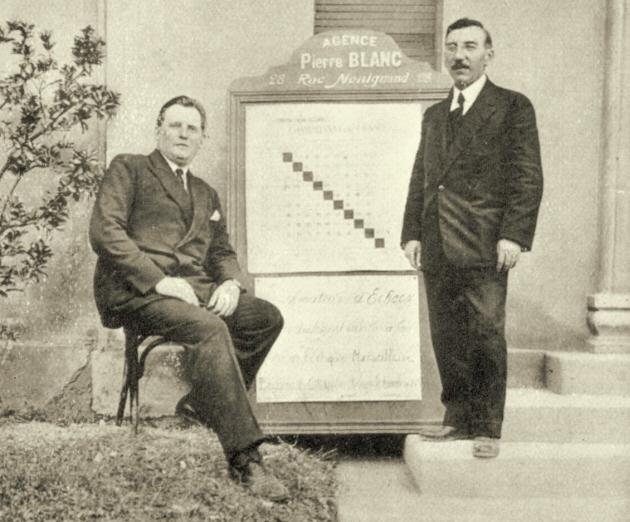
For a photograph of Lazard, see Chess in 1924.
‘Enough of this myth’, wrote André Chéron on page 12 of the Feuille d’Avis de Lausanne, 24 June 1933 (C.N. 7904), about the circumstances of the alleged encounter 1 d4 Nf6 2 Nd2 e5 3 dxe5 Ng4 4 h3 Ne3 5 White resigns.
In the hope of summarizing matters about the Gibaud v Lazard gamelet, we now take a new angle: when were those, or similar, moves first linked to 1924, the year given in many editions of the Guinness Book of Records?
(12193)
To the Chess Notes main page.
To the Archives for other feature articles.
Copyright: Edward Winter. All rights reserved.